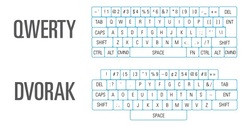
The Germans aren’t the first spy agency to consider switching to typewriters. Last year the people in charge of Kremlin’s communications department decided to buy 20 electric typewriters to minimize the chances of information leaks.
So the typewriter has its uses after all. At a time when they are all but extinct, it’s ironical they are in demand from the very spy masters who take much credit for their reliance on the latest gadgetry. Truly an old economy solution to a new economy problem.
QWERTY VS. DVORAK LAYOUT
It should be interesting to know that the current design of typewriter and computer keyboard layouts, popularly known as QWERTY because of the arrangement of letters in that order, has nothing to do with efficiency or logic. It deliberately increased the distance between the most frequently used letters to prevent the keys from clashing with each other and getting jammed.
The man behind the QWERTY patent, Christopher Scholes, arranged the keys by putting the letters for often-typed English words in difficult-to-reach places, favouring the non-dominant left hand. The arrangement prevented the typewriter keys from getting entangled. Unfortunately, by way of habit, electronic typewriters and computers adopted the same keyboard even though jamming of keys is no longer a concern.
A competing layout, called the Dvorak Simplified Keyboard (DSK) been in existence since 1936. It was designed by Dr. August Dvorak, a former education professor.
It follows a few basic principles:
- Vowels are all on the left home row, the most used symbols are on the left, while the most used consonants are on the right.
- The most common letters should be the easiest to type.
- The least common letters should be on the bottom row which is the hardest row to reach.
- The right hand should do more of the typing because most people are right-handed.
Numerous studies have proved that the Dvorak layout is more efficient. Many operating systems, including Windows, also provide the option to individual users to change their layout to Dvorak. But the dominance of QWERTY continues, even though the original reason for its lettering arrangement has long since ceased to matter.
THE BANDWAGON EFFECT
QWERTY still prevails because what Game Theorists call as the Bandwagon Effect. Whether good or bad, QWERTY usage has become a social convention. As Avinash Dixit and Barry Nalebuff explain in their The Art of Strategy, “The uncoordinated decisions of individuals keep us tied to QWERTY. It is the established system. Almost all keyboards use it. So we all learn it and are reluctant to learn a second layout. Keyboard manufacturers continue, therefore, with QWERTY. The vicious circle is complete.”
After doing some number crunching, the authors conclude that if the fraction of typists using QWERTY falls below 72%, then there is the expectation that DSK will take over. “Fewer than 72% of new typists learn QWERTY, and the subsequent fall in its usage gives new typists an even greater incentive to learn the superior layout of DSK. Once all typists are using DSK, there is no reason for a new typist to learn QWERTY, and it will die out.”
But they add a caveat. “The mathematics says only that we will end up at one of these two possible outcomes: everyone using DSK or 98% using QWERTY. It does not say which will occur. If we are starting from scratch, the odds are in favour of DSK being dominant. But we are not. History matters. The historical accident that led to QWERTY capturing nearly 100% of typists ends up being self-perpetuating…”
Looks like QWERTY is here to stay. But whether the typewriter will make a second coming or not, only the spooks can tell.
e.o.m.
 RSS Feed
RSS Feed
